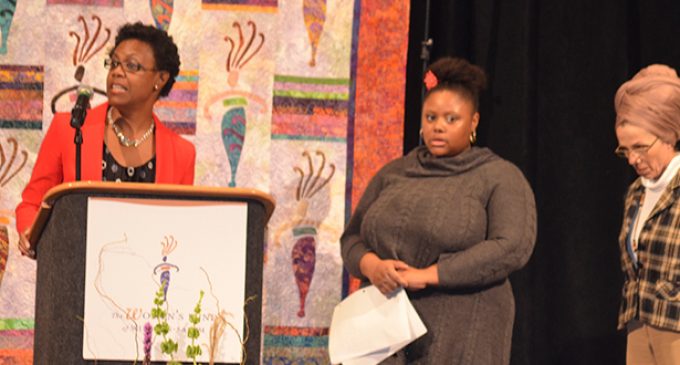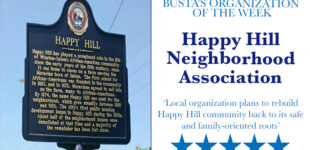Editorial: Government should aid programs that help the poor

Carol Wilson of the Circles Program, left, introduces two participants – Crishanna Cannon, left, and Denise Terry – at The Women’s Fund of Winston-Salem’s 10th annual luncheon on Tuesday, Nov. 17.
Thanksgiving 2015 has come and gone. Many nonprofit organizations are reporting that they served food to this number and that number of people during this time. This is a special holiday, so at this time and at Christmas, people take it upon themselves to do special things.
Now, as Christmas creeps up on us, people are saying needy children need gifts because Christmas is a special time. All children deserve gifts at Christmas, right?
The problem is, how can a child feel like playing when he or she is hungry? How can parents handle the things they need to do when they have headaches because of hunger and frustration because they can’t take care of their families? What happens after Dec. 25?
While Winston-Salem Mayor Allen Joines forms a 21-member panel to combat poverty, many nonprofit organizations are forging ahead to help people get out of poverty. They are not just using elements of President Lyndon B. Johnson’s “War on Poverty,” which Joines says has not worked in 50 years. They are using elements of President Franklin D. Roosevelt’s “New Deal,” which was implemented during the Great Depression in the 1930s.
Under the New Deal, the federal government put people to work on projects that benefited America, such as constructing buildings and bridges.
In this century we had the Great Recession. Many people who could provide for their families just fine lost their jobs and careers, just as during the Great Depression. They were plunged into poverty. Programs today are putting people to work as part of a comprehensive agenda that helps the people involved get out of poverty and helps the organization. One such program is the Circles Program, administered by The Shalom Project, which is helping participants through leadership training, community support and community transformation.
As part of a Women’s Fund of Winston-Salem event announcing grant recipients, participants in the program recently told about how Circles is helping them. They had various reasons for moving into the poverty ranks, but they are moving toward the same outcome: They want to be self-sufficient enough to take care of themselves and their families.
They did not mention that a 21-member panel helped them. People called “allies” helped them. These are individuals who encourage and help people as they go through Circles. One participant told about how she was drifting toward depression until her allies stepped into her life.
What if the 21-member panel would decide that it would disband and just give more money to the programs that work now to bring people out of poverty? What if city government hired poor people to help build projects that are being built with money from the bond issue approved in 2014? Joines claims the War on Poverty has not worked. Tell that to Experiment in Self Reliance. It states on its website: “Like its sister Community Action Agencies (CAA’s) across the nation, ESR was born out of Lyndon B. Johnson’s War on Poverty and the Equal Opportunity Act of 1964, the economic twin to the Civil Rights Act.”
The organization, chartered in 1964, “has served the Winston-Salem/Forsyth County community for more than 50 years, working to eliminate poverty and homelessness, and help people help themselves.”
All members of Winston-Salem City Council are up for re-election in 2016. The filing period to run has opened and will end Dec. 21. There are an estimated 60,000 people in poverty in Winston-Salem. What if those in poverty who are registered to vote did so next year?
Those in poverty now are hard-pressed to wait five years to get out of poverty. Organizations are working now to move people from the poverty statistics to the tax-paying ones. Government officials should look at what is working and provide more money to the organizations in charge of the programs or form their own programs now. If not, there might be new faces looking at how to help the thousands of poor people who helped put them in office.















